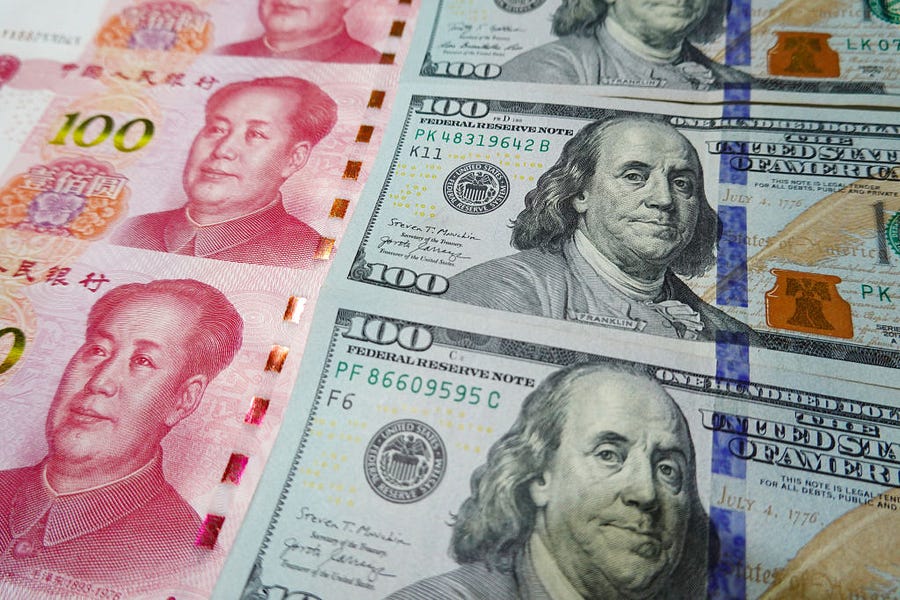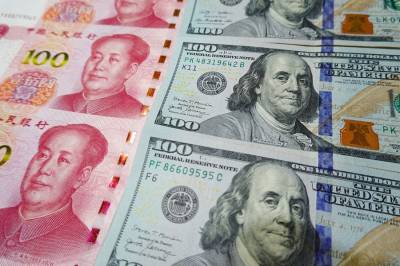A dollar can’t buy you as much at the grocery store as it did last year—unless that grocery store is in another country. The greenback’s strength relative to other currencies is rapidly increasing and sending ripples through the global economy. Though not unprecedented, it’s been decades since the world has seen a dollar this strong.
Why is this happening now?
It’s impossible to pinpoint all the reasons for the strong dollar, but two factors stand out.
First, the Federal Reserve has been more aggressive fighting inflation than many of its foreign counterparts like the Bank of England, the European Central Bank, and the Bank of Japan.
During the COVID-19 pandemic the U.S. pursued an exceptionally generous fiscal policy that eventually helped overheat the economy. The $5 trillion in pandemic stimulus comprised the “largest flood of federal money into the United States economy in recorded history,” according to the New York Times.
“The inflation started sooner here,” said John Cochrane, an economist at Stanford University’s Hoover Institution. “And our central bank, bless their hearts, is still a little more focused on inflation as their primary objective than the Bank of England or the European Central Bank.”
To fight inflation and stabilize prices, the Fed has been raising an inter-bank interest rate known as the federal funds rate, which leads to a higher cost of borrowing for consumers. But that also leads to higher yields in the U.S. bond market. Taken together with other global economic factors, that makes the dollar a safer currency for investors.
A second cause of the strong dollar is political and economic turmoil across the globe. With a land war and energy crisis in Europe—and China handicapped by its “zero COVID” policy—American domestic issues look relatively tame. Investors perceive the dollar as a “refuge in troubled times,” a better long-term investment than the pound or the euro.
“The dollar is strong both because of the steep upward path for monetary policy in the U.S., and because other parts of the world are less safe, particularly Europe,” said Anna Leach, deputy chief economist at the Confederation of British Industry.
What does the strong dollar mean for Americans?
Favorable exchange rates make now a great time for Americans to travel abroad on the cheap, and companies that import foreign goods to the United States get the same benefit on a larger scale. Beyond that, the impact of the strong dollar depends on who you are.
Companies that export American goods to other countries may find their balance sheets tightening as the payment they receive comes in units less valuable than the dollars they used to produce those goods. One recent example? Microsoft.
Eventually, that tightening could lead companies to raise prices, which could in turn dampen demand.
But for many domestic businesses, the relative strength of the dollar isn’t much of a consideration in day-to-day operations. “The U.S. is a pretty big economy, so a lot of companies don’t really feel international things as much,” Cochrane said. “For an average company in the U.S. that buys most of its stuff domestically and sells most of its stuff domestically, it’s not really that big an issue.”
What does the strong dollar mean for the global economy?
Foreign businesses selling to global, dollar-dominated markets stand to benefit from the strong dollar—especially when they can make profits in dollars while continuing to pay for their inputs in less-valuable local currencies. “That’s really good for agricultural exporters, say, or mineral exporters,” Cochrane observed.
But there is a downside. “Anyone who’s borrowed in dollars is in trouble,” he said. Foreign governments, banks, and businesses that took out short-term debt in dollars now need to spend more domestic currency to meet their dollar obligations, making them more prone to default on those loans and increasing the risk of a global recession.
Recession concerns lead investors to lean even more heavily on the dollar—prompting some commentators to warn about the possibility of a “dollar doom loop” crippling the global economy.
A strong dollar isn’t necessarily good for the global economy, but it’s good for what Leach called the “brand” of the U.S. economy. It’s not “a sign that the U.S. has necessarily done all the right things,” she said. But the dollar is where investors go in tough times, which is “a positive signal about the health and the opportunity inherent in the U.S. economy on a general basis.”






Please note that we at The Dispatch hold ourselves, our work, and our commenters to a higher standard than other places on the internet. We welcome comments that foster genuine debate or discussion—including comments critical of us or our work—but responses that include ad hominem attacks on fellow Dispatch members or are intended to stoke fear and anger may be moderated.
With your membership, you only have the ability to comment on The Morning Dispatch articles. Consider upgrading to join the conversation everywhere.